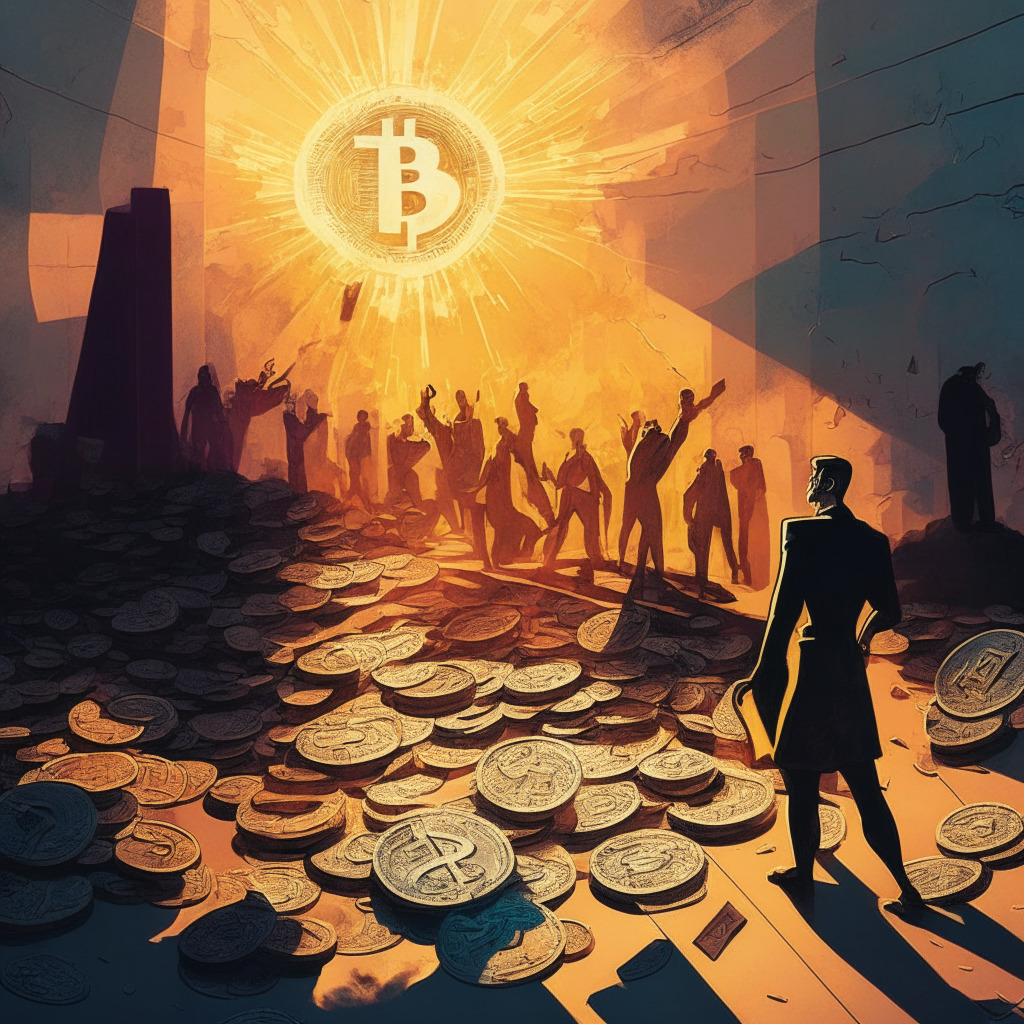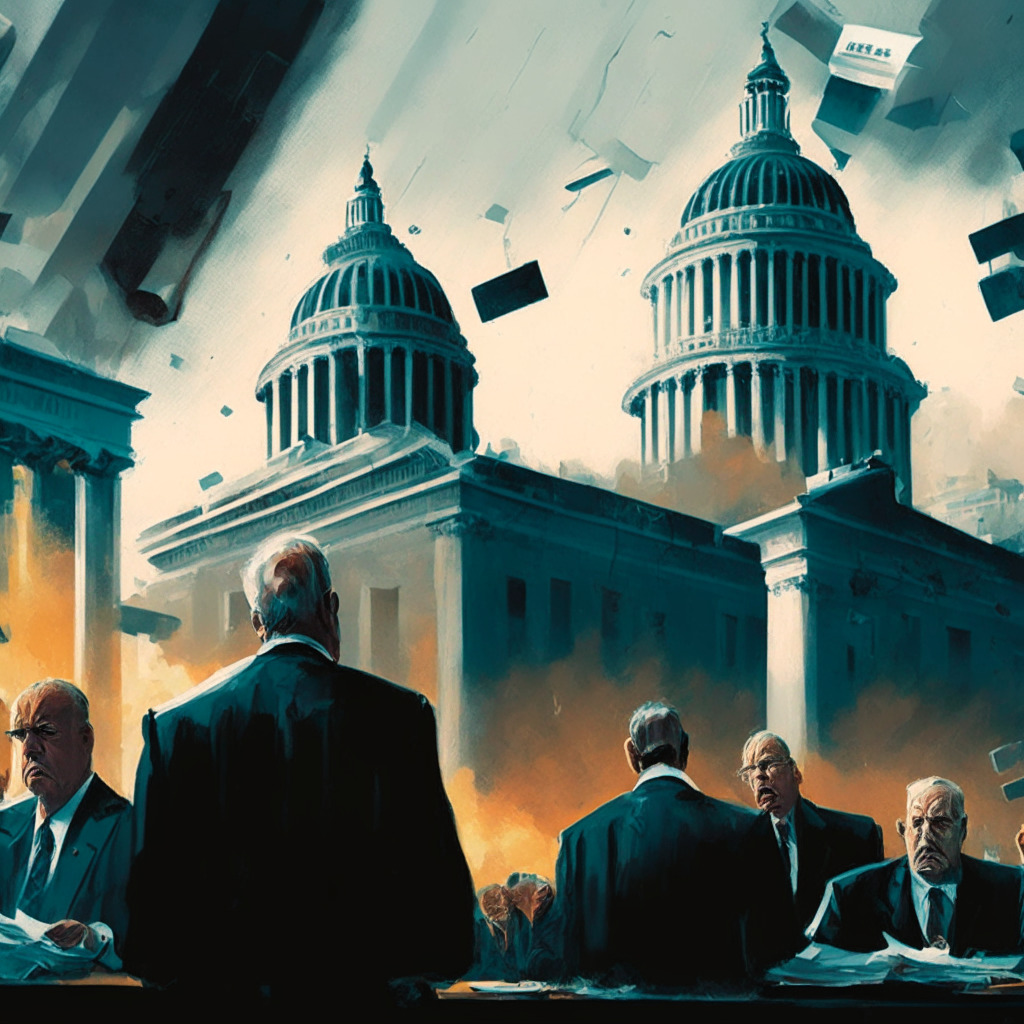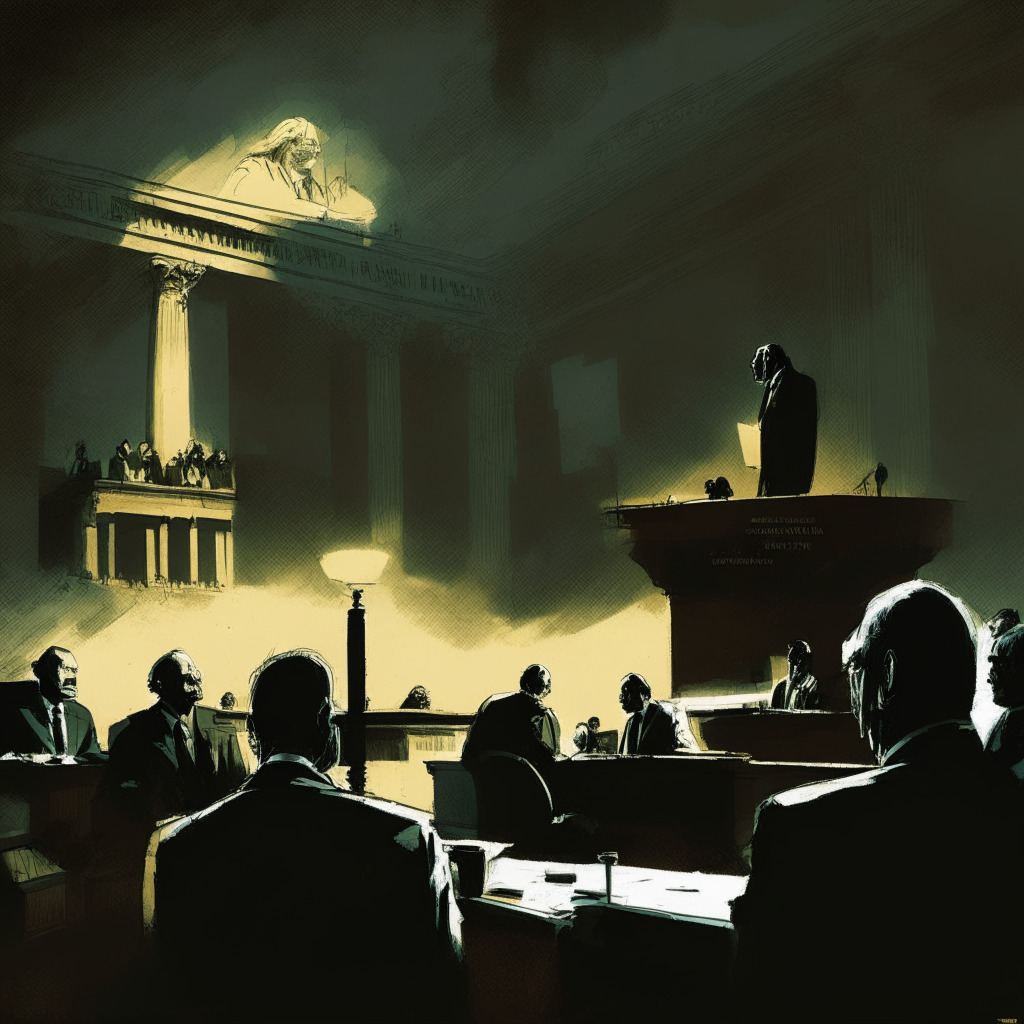The United States Government Accountability Office (GAO) report cites poor governance and unsatisfactory risk-management practices as primary causes of Signature Bank’s failure in March, acknowledging the bank’s exposure to the crypto industry as a potential contributing factor. The continued debate on the role of crypto in failed banks’ circumstances directly affects the fintech and regulatory spaces.
Search Results for: Silicon Valley Bank
Tether’s Banking Partnerships: An Advance Toward Global Inclusivity or a Regulatory Nightmare?
Tether, the issuer of popular stablecoin USDT, has partnered with Britannia Bank & Trust, a private bank based in The Bahamas, for processing dollar transfers. Notwithstanding critics’ doubts over the assets backing the $86 billion held by Tether, it accounts for around 66.5% of the total stablecoin market.
Regulatory Shift: The Stifling or Stability of Cryptocurrency in U.S. Banking
“The U.S. FDIC’s latest risk report indicates a shift from previously indifferent stance towards considering cryptocurrency as an area of concern. The 2023 Risk Review shows FDIC’s readiness to initiate discussions with banks about crypto-asset activities, echoing similar sentiments across U.S. banking agencies. Yet, it also reveals the complex balancing act required in integrating digital assets safely into the conventional banking system.”
Banking Crisis Ripple: Heartland Tri-State Bank’s Collapse & Its Implications on Industry Safety
“The disruption in the U.S. banking sector, illustrated by the recent collapse of Heartland Tri-State Bank, is attributed to rising U.S. interest rates and inadequate risk management. This crisis highlights a need for improved banking system safety measures and increased bank executive accountability.”
Stablecoins: A Safer Alternative to Banking or a Risky Proposition?
“Brendan Malone, a former Federal Reserve Board analyst, posits stablecoins might pose less risk than traditional bank deposits. Stablecoins, such as Tether’s USDT and Circle’s USD Coin, offer an efficiency-laden alternative to traditional banking, given its insulation from the typical crypto volatility.”
Stablecoins Disrupting Financial System: Are They Really Riskier than Bank Deposits?
According to former Federal Reserve Board analyst, Brendan Malone, stablecoins are less risky than bank deposits and are not akin to money market funds. He argues that stablecoins, backed by fiat currencies and typically short-dated Treasuries, do not pose similar risks as banks due to the absence of mismatches between short-term liabilities and long-term assets. Regulating stablecoins similarly to traditional financial entities could, however, limit competition and increase market dominance.
Blockchain’s Impact on Traditional Banking: Analyzing the PacWest and Banc of California Merger
“The PacWest-Banc of California merger, backed by a $400 million equity injection from Warburg Pincus and Centerbridge, promises resilience amidst unstable banking conditions. However, the rapidly evolving landscape of decentralized financial systems like blockchain challenges the sustainability of traditional banking models.”
Navigating the Abyss: Banking Crises, Counterparty Risks and the Rise of Crypto Solutions
“Sombre banking crises globally reveal the fragility of traditional banking systems. Crypto presents an exciting possibility – self-custody. This enables investors to control risk factors, gain insight into asset compositions and oversight over counter-party involvement in the asset cycle, hence highlighting the dire need for alternative financial systems.”
Collapse of Crypto-Friendly Banks: Time to Rethink Deposit Insurance Limits?
Circle and Sequoia Capital were among top depositors in collapsed Silicon Valley Bank (SVB), raising concerns about depositor fund security and current regulations in the crypto space. The situation highlights the potential need for increased deposit insurance limits as more financial institutions embrace cryptocurrencies and blockchain technology.
Collapsed BitGo-Prime Trust Deal: A Red Flag for Crypto Banking Stability?
The collapse of the acquisition between BitGo and Prime Trust highlights inherent risks and instability in the crypto banking industry. With setbacks generating significant concern about the stability and regulatory standing of crypto banks, investors and participants must remain vigilant and cautious when dealing with related ventures.
US Lawmakers Target Banking Failures: Impact on Crypto and Blockchain Industries
In response to major banks’ failures, US lawmakers from the House Financial Services Committee have introduced a series of bills, although not specifically mentioning crypto or blockchain. The future of regulations surrounding banks and their potential impact on the cryptocurrency and blockchain industries remain uncertain, with past lawmakers expressing optimism on stablecoin bills.
Custodia Bank Case: The Game Changer for Crypto Regulation and Industry Growth?
The Custodia Bank case could introduce new regulatory standards for banks working with digital assets, potentially impacting the wider cryptocurrency industry. The outcome may affect the sector’s stability, growth, and the balance between regulation and innovation.
Bankrupt FTX’s Anthropic Stake Sale: Navigating the Future of AI and Crypto Exchange Loss Recovery
The now-defunct cryptocurrency exchange FTX is looking to offload its stake in AI startup Anthropic, following bankruptcy. Anthropic, valued at $4.6 billion, is developing a general-purpose AI chatbot called Claude. The potential sale’s outcome may impact former FTX customers and stakeholders.
Creating the Ultimate Crypto-Friendly Bank: Overcoming Challenges and Seizing Opportunities
Santiago R. Santos recently proposed building a new “crypto-friendly bank” to fill the void left by the collapses of major crypto-friendly banks. Despite challenges, Santos envisions assembling a team, guided by his experience from the crypto and traditional finance worlds, to create a bank servicing individuals, businesses, and institutions in the ever-growing crypto industry.
Genesis Bankruptcy Battle: FTX’s $3.9B Claim vs. Expedited Settlement – The High-Stakes Faceoff
FTX objects to extending court-mediated settlement talks for bankrupt crypto lender Genesis and opposes estimating their debtors’ claims at $0.00. As Genesis’ largest creditor with $3.9 billion claims, FTX’s objection adds to mounting pressure from individual creditors seeking faster resolution. Meanwhile, Genesis faces lawsuits and SEC actions over its customer lending program, Earn.
Stablecoins: A Solution to Crypto’s Banking Crisis Amid Operation Chokepoint 2.0
Stablecoins may counter the impact of Operation Chokepoint on the crypto sector, providing a solution to the US banking crisis facing crypto companies. Leveraging stablecoins can minimize bank dependency and establish an autonomous parallel financial system, despite potential risks and regulatory challenges.
Bank Collapse: A Cautionary Tale of Crypto-Fear and Public Education
Barney Frank blamed industry outsiders for Signature Bank’s collapse, arguing their crypto dealings were “safe and sound” prior to regulators stepping in. Public confusion and “crypto-fear inaccurate withdrawals” contributed to the institution’s failure, highlighting the importance of educating the public to avoid future crises in the crypto industry.
US Banking Crisis: Crypto Downturn & Big Returns for Risk-Takers, Weighing Pros & Cons
The recent US regional banking crisis highlights the disparity between major Wall Street banks and smaller institutions, affecting US banking stocks. Investor Michael Burry purchased shares in beleaguered banks, and amidst market uncertainty, the crypto market experiences a downturn.
Fed’s Actions and Crypto Market: How Jerome Powell’s Remarks Impact BTC and Central Banks
Amid mixed crypto market expectations, US Fed Chairman Jerome Powell discussed the US banking system’s strength and resilience to support liquidity without compromising monetary policy. Investors must stay vigilant as decisions made by the Fed and central banks’ involvement in cryptocurrency could impact market sentiment and regulations.
Failed Banks Blame Crypto: Is it Deflection or Legitimate Concern?
US Senators criticize executives of failed banks for deflecting responsibility for poor management onto digital asset firms. Senator Lummis highlights divergence in perspectives on digital assets’ role in recent bank failures. Transparency and accountability in banks dealing with digital assets are essential in building trust and adapting to the rapidly changing landscape.
Collapse of Signature Bank: Crypto Scapegoat or Executive Greed? Debating the True Culprit
Former Signature Bank chairman Scott Shay faces criticism for blaming the cryptocurrency industry for the bank’s collapse, while potentially collecting millions in bonuses and stock options. Senators Warren and Lummis argue that current laws allow executives like Shay to recklessly crash banks, jeopardizing the economy, and demand clawbacks of “crazy paychecks.” Blockchain understanding remains crucial amidst evolving digital asset complexities.
Did Crypto Cause Signature Bank’s Collapse? Debating Reasons and Regulator’s Intentions
Two executives from the defunct Signature Bank testified before Congress, asserting that the bank could have recovered despite customer withdrawals of $16 billion. Questions about the role of crypto in the bank’s shutdown remain unanswered, with regulators denying that it was related to crypto exposure.
Bank Failures: Are Digital Assets the Culprits or Scapegoats? Debating Responsibility and Regulations
This excerpt raises questions about the impact of digital assets on traditional banking institutions and whether it’s fair to blame cryptocurrencies for bank failures. It emphasizes the importance of collaboration between stakeholders, regulators, and the banking sector to ensure a well-regulated environment fostering growth and stability in both traditional banking and cryptography sectors.
Banking Crisis Fears Boost Crypto Markets: Balancing Innovation and Financial Security
Amid the potential US regional banking crisis, the uncertainty in the banking sector has proven to be bullish for Bitcoin prices. The rise of cryptocurrencies and decentralized finance offers potential solutions to traditional banking challenges during times of economic uncertainty while also prompting concerns and striking a balance between innovation and security.
Collapse of Signature Bank: Crypto Exposure, Regulation, and Lessons for the Future
The collapse of Signature Bank highlights the potential systemic risks posed by crypto-linked banking activities and the importance of stringent regulatory oversight. It serves as a cautionary tale about unchecked growth, inadequate risk management, and the need for proper risk management practices in the volatile and rapidly evolving crypto industry.
FDIC Blames Crypto for Bank Collapses: Analyzing Risk Factors and Future Implications
The FDIC chair, Martin Gruenberg, attributes non-compliance with risk controls, poor governance, and dependence on uninsured crypto deposits to the collapse of crypto-friendly banks like Signature Bank and Silicon Valley Bank. While cryptocurrencies played a part, sound governance and responsible investments are essential for financial stability.
Crypto Bank Runs: The Role of Whales and Risky Investments in Market Turmoil
A recent study found that the 2022 crypto bank runs were majorly triggered by whale account holders withdrawing large portions of their funds. Crypto platforms’ run risks arose from allowing unrestricted withdrawals while using funds for risky, illiquid investments, highlighting policy concerns.
Signature Bank Collapse: Crypto Exposure’s Role and Lessons for Future Regulations
FDIC Chairman Martin J. Gruenberg suggests that the failure of Signature Bank may be partly due to its inability to comprehend risks tied to cryptocurrencies and inadequate management. While the direct impact of crypto exposure on the bank’s collapse remains unclear, it highlights the need for closer scrutiny on crypto market regulations.
BlockFi Bankruptcy: Creditors Blame Management, Not FTX, for Company’s Downfall
The BlockFi Creditors Committee disputes BlockFi’s claim of being a victim of FTX and Alameda, blaming poor management decisions for the company’s downfall. They highlight a series of financial losses, potential tax complications for customers, and mishandling of customer funds. Despite recent rulings, BlockFi’s future depends on claims against Alameda and FTX.
Crypto Bank Closures: Striking a Balance Between Regulation and Innovation
Signature Bank reduced digital asset deposits due to increased volatility and regulatory concerns, according to former chairman Scott Shay. The collapse of three crypto-focused banks in March impacted the crypto industry, raising questions on whether regulatory intervention and banks’ decisions are necessary for financial stability or inadvertently stifle the growth of the crypto and blockchain industry.
Michael Burry’s Strategic Moves in Distressed US Banks and Crypto: Opportunities or Risks?
Michael Burry, the “Big Short” investor, strategically acquires shares in distressed banks, boosting confidence in banking stocks. Despite crises and valuation slumps, Burry’s investments tackle different avenues within the banking ecosystem, while also exploring the digital currency space. Market research is crucial for investment decisions.
Bank Deposits Decline: Crypto’s Surge or Inflation’s Crippling Effects?
US bank deposits are nearing $17 trillion, possibly signaling a shift towards cryptocurrencies like Bitcoin. Factors like bank failures, inflation concerns, and increased interest rates contribute to this decline, driving investors to explore alternative investment opportunities such as crypto. However, caution and thorough research are necessary before committing to cryptocurrency investments.






























